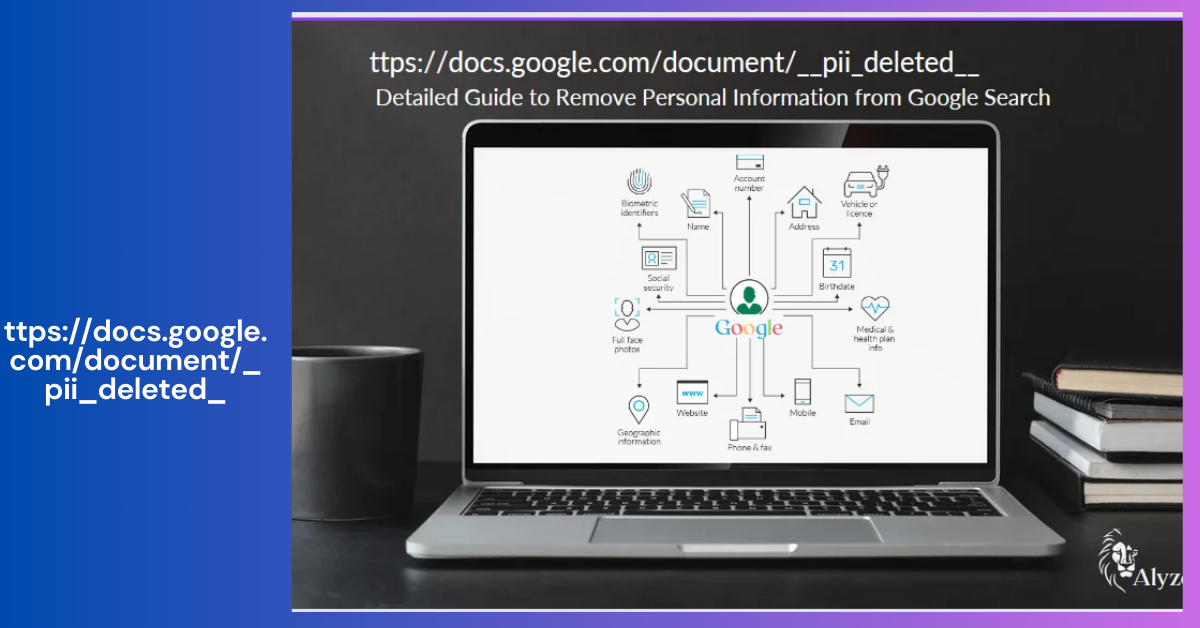
In today’s digital age, data privacy and security are of paramount importance. One notable example of this is the “https://docs.google.com/document/_pii_deleted_” link, which signifies that sensitive information has been removed from a Google Document.
This article delves into the implications of the “pii_deleted” suffix, its relevance, and why it is crucial for maintaining data privacy.
We will explore its impact on users and organizations, and provide actionable insights to help you understand this aspect of digital privacy better.
What Does “https://docs.google.com/document/_pii_deleted_” Mean?
The Significance of “pii_deleted”
The suffix “pii_deleted” in a Google Document link indicates that personally identifiable information (PII) has been redacted or removed from the document.
PII includes any information that can be used to identify an individual, such as names, addresses, phone numbers, and email addresses. Google implements this process to protect users’ privacy and comply with data protection regulations.
Why Google Redacts PII
Redacting PII is part of Google’s broader commitment to safeguarding user data. By removing sensitive information, Google ensures that documents shared or published online do not expose personal details that could lead to identity theft or other forms of misuse.
This practice aligns with global data protection standards, such as the General Data Protection Regulation (GDPR) in the European Union and various privacy laws in the United States.
The Process of Redacting PII
Automated Detection and Removal
Google employs advanced algorithms and machine learning techniques to detect and remove PII from documents.
These tools scan the content for patterns that match known types of sensitive information. Once identified, this information is either deleted or replaced with placeholder text to ensure it cannot be retrieved.
Manual Review
In addition to automated systems, Google also has processes for manual review of documents. This ensures that sensitive information not caught by algorithms is still addressed.
Manual reviews involve human evaluators who examine documents to ensure compliance with privacy standards.
Implications of PII Redaction
Enhanced Privacy for Users
The primary benefit of PII redaction is enhanced privacy for users. By removing sensitive information, Google helps prevent unauthorized access and potential abuse of personal data.
This practice is especially important in environments where documents are shared publicly or with multiple users.
Compliance with Data Protection Laws
PII redaction helps organizations and individuals comply with various data protection laws and regulations. By ensuring that documents do not contain sensitive information, users avoid legal issues related to privacy breaches and data mishandling.
Impact on Document Usability
While redacting PII protects privacy, it can sometimes affect the usability of documents.
For example, if a document’s content relies on specific personal details, the removal of this information might alter its intended use or meaning. It is crucial to balance privacy with document functionality.
Best Practices for Managing Sensitive Information
Regularly Review and Update Privacy Policies
Organizations should regularly review and update their privacy policies to ensure they align with current regulations and best practices.
This includes implementing robust procedures for handling and redacting sensitive information.
Use Secure Document Sharing Methods
When sharing documents, use secure methods that limit access to authorized individuals. This includes using password protection, encryption, and secure sharing platforms to prevent unauthorized access to sensitive information.
Educate Users on Data Privacy
Educating users about data privacy and security is essential. Training programs should cover best practices for handling sensitive information and the importance of redaction in protecting privacy.
Conclusion
Understanding the significance of “https://docs.google.com/document/_pii_deleted_” and the process of redacting PII is crucial for maintaining data privacy in the digital age.
By removing sensitive information from documents, Google and other organizations help protect users from potential misuse of their personal data.
Implementing best practices for managing sensitive information and staying informed about privacy regulations can further enhance data security and compliance.
Incorporating these insights into your digital practices will not only safeguard your personal information but also contribute to a more secure online environment.
By staying vigilant and proactive about data privacy, you can ensure that your information remains protected in today’s interconnected world.
FAQs About “https://docs.google.com/document/_pii_deleted_”
What happens if PII is not redacted from a document?
If PII is not redacted, it can lead to privacy breaches and potential misuse of personal information. Unauthorized access to sensitive data can result in identity theft, fraud, and other negative consequences.
How does Google detect PII in documents?
Google uses advanced algorithms and machine learning to detect PII. These systems analyze document content for patterns that match known types of sensitive information. Additionally, manual reviews help ensure that PII is accurately identified and removed.
Can I retrieve deleted PII from a document?
No, once PII is removed from a document, it cannot be retrieved. Google’s redaction process ensures that sensitive information is permanently deleted to protect user privacy.
What should I do if I find that my PII was exposed in a document?
If you find that your PII was exposed, report the issue to the document owner or the relevant platform immediately. They should take appropriate actions to rectify the situation and prevent further exposure.
How can I ensure my documents are free from PII before sharing them?
To ensure your documents are free from PII, review the content carefully before sharing. Use tools and services that offer redaction features, and consider seeking assistance from professionals if necessary.





